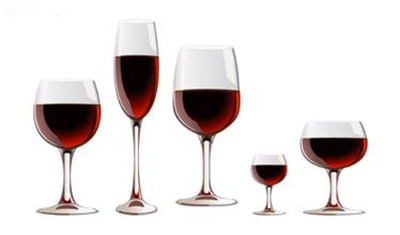(单词翻译:单击)
听力文本
This is Scientific American — 60-Second Science. I'm Christopher Intagliata.
Ever order a drink, and feel stiffed on the pour? Well, before you bother the bartender, take a closer look at the size of your glass. "So people will generally perceive there to be less in larger containers, than in smaller ones." Theresa Marteau, a behavioral scientist at the University of Cambridge, in England.
She and her colleagues had analyzed how larger portions — and larger plates — lure us into eating more food. And they wondered: could the same be true for alcohol?
So the researchers convinced the staff at a local bar to run an experiment: every two weeks, for four months, they'd rotate the bar's wine glasses from the standard 300 milliliter size, to either slightly larger — 370 milliliters, or slightly smaller — 250 milliliters. And see how the size of the glass affected patrons' drinking habits, even though the pour, the volume of alcoholic beverage, was unchanged.

Turns out, serving wine in smaller glasses had no measurable effect. But the large glasses boosted wine sales 10 percent — even after controlling for day of the week, temperature, holidays and so on. The reason? "When the wine, the same volume, is being served in a larger glass, then people are probably perceiving they've got less in there." Which, she says, means they might drink more, assuming they haven't hit their nightly limit. Or, they might just feel less satisfied with the pour, and buy another round. The study appears in the journal BMC Public Health.
Aside from altering her own habits — "I do use smaller glasses, yes"—Marteau says that, if subsequent studies confirm this effect, public health officials might consider mandating a certain average glass size. "Specifying the size, the maximum size in which wine can be sold could be a measure that's introduced to reduce the overconsumption of alcohol that seems to be cued by the glass size." Until that happens, the bar in the study now always serves its wine in the larger glasses.
Thanks for listening Scientific American - 60-Second Science Science. I'm Christopher Intagliata.
参考译文
这里是科学美国人——60秒科学。我是克里斯托弗·因塔利亚塔。
在点的酒上来以后,你在倒酒时有没有觉得很不方便?在麻烦服务员以前,请你仔细观察一下酒杯的大小。“一般来说,人们认为大容器里面的酒比小容器里的少。”英国剑桥大学行为科学家特丽萨·马尔托说。
她和同事就大份量和大盘子如何诱使我们吃更多食物进行了分析。他们想知道:这对酒类是否同样适用?
研究人员说服当地一家酒吧的工作人员进行了一项实验:在四个月的时间里,每隔两周轮流将酒吧里酒杯300毫升的标准容量调至370毫升的大容量和250毫升的小容量。然后观察酒杯的容量如何影响顾客的饮酒习惯,在这一过程中,酒精饮料的倾倒和分量保持不变。
结果发现,用小容量酒杯供应酒没有产生明显的影响。但是使用大容量酒杯使酒的销售量上涨了10%,这是在控制供应天数,计算温度和假日等影响后得出的结果。原因是什么?“同样分量的酒以大容量酒杯供应时,人们可能会认为酒杯里的酒少了。”她说,这表明顾客在还能喝的情况下,可能会喝更多的酒。或者,他们可能会在倒酒时感到不太满意,然后会再买一杯。这一研究结果发表在《英国医学委员会公共健康》期刊上。
除了改变自己的习惯以外,马尔托表示她本人用小容量酒杯饮酒,她说,如果后续研究能确认这一影响,那公共建康官员可能会考虑对酒杯的平均容量进行规定。“对各类酒在出售时可以供应的酒杯容量进行规定,明确最大容量,这一措施可以减少因酒杯容量而引发的酒精过度消费情况。”在规定出台前,进行实验的酒吧仍在用大容量酒杯供应酒。
谢谢大家收听科学美国人——60秒科学。我是克里斯托弗·因塔利亚塔。
译文为可可英语翻译,未经授权请勿转载!
重点讲解
重点讲解:
1. convince sb. to do sth. 说服;
例句:I am seeking to convince Karen to go out with me.
我正试着劝说凯伦和我一起出去。
2. even though 即使;
例句:Even though he's old he's game for anything.
尽管他年岁已大,但他对什么都敢作敢为。
3. and so on 如此等等;
例句:These cars vary in size, price, colour and so on.
这些汽车在大小、价格、颜色等方面各不相同。
4. aside from 除了…外;
例句:Aside from canceling a few dates, I kept working.
除了取消了几个约会外,我一直在工作。


